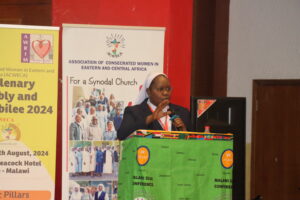VATICAN: Avoid ‘sins of the media,’ Pope Francis urges Italian TV personnel

 |
| Pope Francis |
The Holy
Father Pope Francis on 15th December met with the managers and
workers of TV2000, an Italian Church television broadcasting company, with whom
he wished to share “three thoughts on the role of the communicator”, recalling
that “the Catholic media have a very difficult mission in relation to social
communication: seeking to preserve it from all that distorts and twists it for
other purposes.
Father Pope Francis on 15th December met with the managers and
workers of TV2000, an Italian Church television broadcasting company, with whom
he wished to share “three thoughts on the role of the communicator”, recalling
that “the Catholic media have a very difficult mission in relation to social
communication: seeking to preserve it from all that distorts and twists it for
other purposes.
Often
communication is subject to propaganda, ideologies, political ends, or for the
control of the economy or technology. The first thing that is beneficial to
communication is parrhesia, or rather the courage to speak directly, to speak
frankly and freely. … If, instead, we are worried about tactical aspects, our
words become artificial, and we communicate nothing. Freedom also means freedom
from fashions, clichés, and pre-packaged formulas. … We must reawaken words.
But every word has a spark of fire and life within. Reawaken that spark, so
that it comes out. So this is the first task of the communicator: to reawaken
the word.”
communication is subject to propaganda, ideologies, political ends, or for the
control of the economy or technology. The first thing that is beneficial to
communication is parrhesia, or rather the courage to speak directly, to speak
frankly and freely. … If, instead, we are worried about tactical aspects, our
words become artificial, and we communicate nothing. Freedom also means freedom
from fashions, clichés, and pre-packaged formulas. … We must reawaken words.
But every word has a spark of fire and life within. Reawaken that spark, so
that it comes out. So this is the first task of the communicator: to reawaken
the word.”
Secondly, he
emphasized the need to avoid “filling” and “closing”; the first takes the form
of “saturating our perceptions with an excess of slogans that annul our
thoughts instead of setting them into motion”, whereas the second is that of
seeking short cuts instead of favouring longer and more complex routes of
understanding, “choosing to present an individual as if he or she could solve
all our problems, or on the contrary, as a scapegoat onto whom we can discharge
all our responsibilities. [It is] jumping to conclusions immediately, instead
of making the effort to represent the complexity of real life.”
emphasized the need to avoid “filling” and “closing”; the first takes the form
of “saturating our perceptions with an excess of slogans that annul our
thoughts instead of setting them into motion”, whereas the second is that of
seeking short cuts instead of favouring longer and more complex routes of
understanding, “choosing to present an individual as if he or she could solve
all our problems, or on the contrary, as a scapegoat onto whom we can discharge
all our responsibilities. [It is] jumping to conclusions immediately, instead
of making the effort to represent the complexity of real life.”
Finally, Pope
Francis mentioned the third mission, “Speaking to the whole person … avoiding
the sins of the media: disinformation, slander and defamation”. Authentic
communication, he stressed, “is not concerned with attention-grabbing. … It is
necessary to speak to people as a whole: to their mind and their heart, so that
they know how to see beyond the immediate, beyond a present that risks being
forgetful and fearful of the future”. Of these three sins, “the most insidious
is disinformation, as it leads to mistakes and to believing only a part of the
truth.”
Francis mentioned the third mission, “Speaking to the whole person … avoiding
the sins of the media: disinformation, slander and defamation”. Authentic
communication, he stressed, “is not concerned with attention-grabbing. … It is
necessary to speak to people as a whole: to their mind and their heart, so that
they know how to see beyond the immediate, beyond a present that risks being
forgetful and fearful of the future”. Of these three sins, “the most insidious
is disinformation, as it leads to mistakes and to believing only a part of the
truth.”
These three
tasks bring to life “the culture of encounter, so necessary in an increasingly
pluralistic context. Confrontation does not lead anywhere”, he concluded.
“Creating a culture of encounter: it is an important job for you”.
tasks bring to life “the culture of encounter, so necessary in an increasingly
pluralistic context. Confrontation does not lead anywhere”, he concluded.
“Creating a culture of encounter: it is an important job for you”.
SOURCE: Vatican Information
Services (VIS)
Services (VIS)


